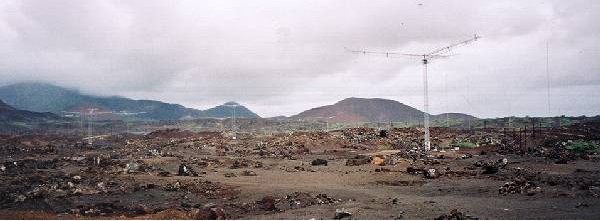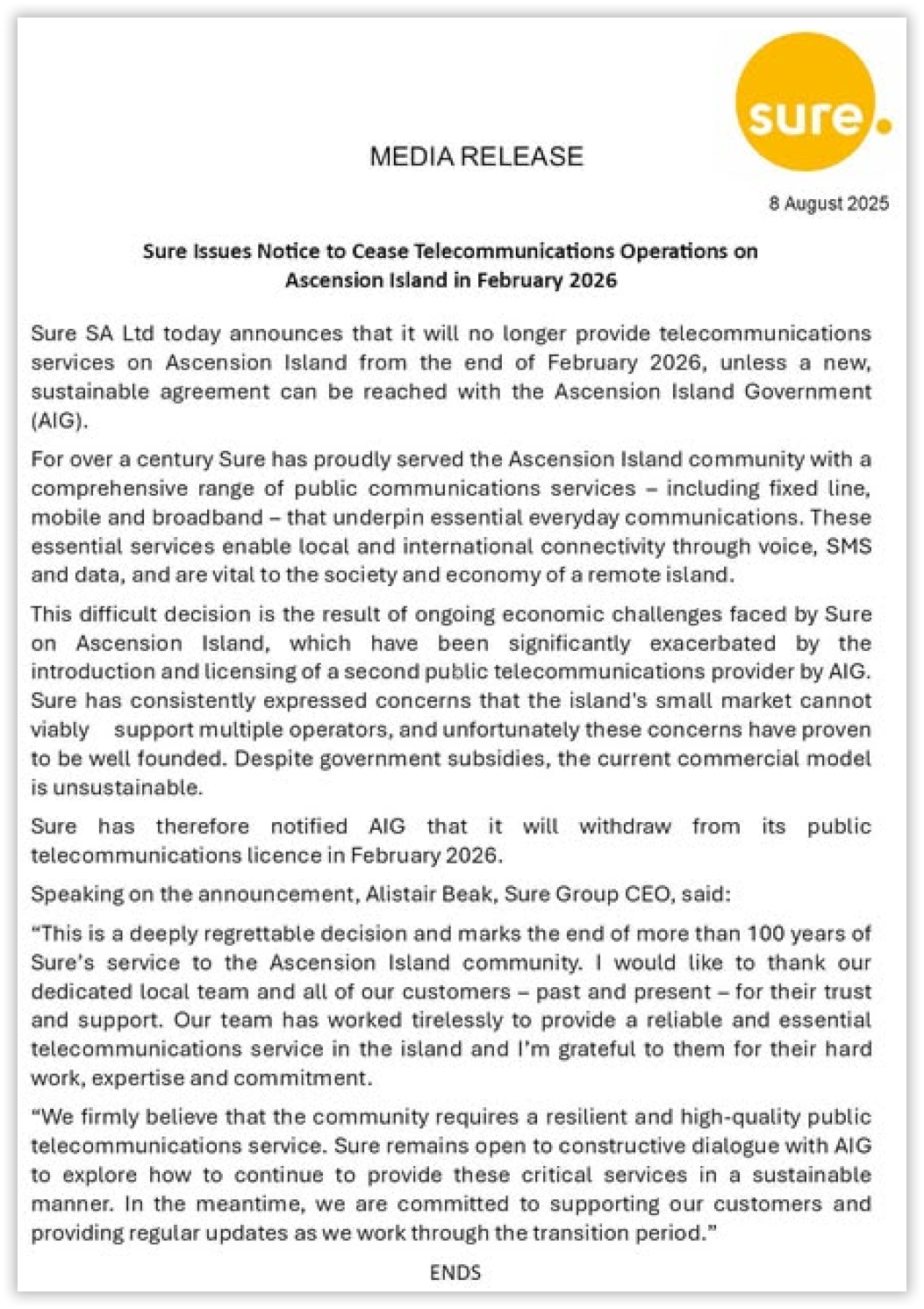
Reader overview
In the opinion of many, Sure Ascension’s public notice to withdraw from Ascension Island is a deliberate negotiation tactic aimed at pressuring the local government amid Starlink licensing debates. While legally sound, the move raises serious ethical concerns by prioritising Sure’s monopoly over essential communications in a small community. The timing suggests a strategic play extending beyond Ascension, potentially influencing ongoing negotiations in the Falkland Islands and St Helena. Also, the UK government could have several concerns regarding Sure’s press release, especially given Ascension’s status as a UK Overseas Territory.

I first wrote about the Ascension Island situation regarding wide-scale Starlink usage in May 2024 in the post Part One, the Ascension Island story. It was routinely reported at the time that Sure had stated that continuing their operation would be threatened if the Ascension government allowed Starlink operation in the island. However, the Ascension government reacted by issuing class licences for £10 to individuals who wanted to use Starlink.
To bring the story up to date, Sure Ascension issued the following press release on August 8, 2025.
By issuing a public notice of withdrawal while leaving the door open to “constructive dialogue,” it is essentially an overt and ‘over-the-top’ negotiating tactic aimed at the Ascension Island Government and possibly other British Overseas Territories where Sure provides exclusive telecommunications services and is negotiating to keep them.
Sure, Ascension’s stance in the press release sits in an ethically grey space. It’s not outright unethical in the sense of breaking laws or making false claims, but morally questionable when you consider the monopolistic power they hold in a small market and community dependency. Looking at things from a commercial angle, it’s highly likely that it was a highly loss-making initiative anyway, cross-subsidised by Sure Falkland Islands and Sure St Helena.
It could be regarded as being cynical that Sure signals openness to dialogue rather than presenting the decision as final and irrevocable.
The “unless a sustainable agreement can be reached” clause leaves room for interpretation, potentially creating uncertainty for residents and the government. This uncertainty will be used as leverage in negotiations, a tactic that, while common in business, is ethically ‘sensitive’ when the stakes are essential services.
Their position is lawful and framed in business terms, but it uses dependency leverage – the idea that because the community needs their service, their withdrawal threat will prompt concessions. This is ethically questionable in small, isolated markets where consumers have no viable short-term alternatives. The key concern is that such tactics prioritise commercial self-preservation over the broader principle of equitable access to communication, which is considered an essential right in modern society.

The relevance to the Falkland Islands.
The timing of Sure’s Ascension’s press release appears closely connected to the ongoing negotiations with the Falkland Islands Government (FIG) regarding Starlink’s approval to operate within the islands. These talks are particularly significant as they also coincide with the start of discussions about the future of telecommunications in the Falklands, especially with Sure’s exclusive license set to expire in December 2027. The outcome of these negotiations will shape the Falkland Islands’ telecom landscape for decades to come.
For many observers, Sure’s move on Ascension serves as a clear signal of the company’s intended approach to negotiations in the Falklands. Rather than pursuing immediate legal challenges following FIG’s approval of Starlink, Sure seems to be adopting a more subtle strategy, using public pressure and negotiation tactics to influence government decisions. The Ascension withdrawal notice, issued as a public press release rather than a private communication, was designed to sway public opinion and raise concerns about market fragmentation and service sustainability.
Sure could replicate this approach in the Falkland Islands by releasing carefully worded public statements framed around the theme of “protecting a sustainable local service.” This language allows them to position themselves as defenders of reliable telecommunications rather than opponents of new technology or competition. Sure would believe that it effectively shifts the narrative from outright opposition to Starlink to a more nuanced argument about maintaining service quality and commercial viability.
During negotiations, Sure is likely to reference Ascension as a “real-world example” of the risks associated with allowing multiple providers to operate in a small market where Sure has a monopoly. While this would stop short of an explicit threat, it would serve as a cautionary tale, implying that market fragmentation could lead to Sure ceasing operations, which would negatively impact the community. The implicit message would be, “Look at what happened on Ascension; we do not want the same outcome here, but it remains a real possibility.”

Should the UK Government be concerned?
The UK government could have several concerns regarding Sure’s press release about Ascension Island’s telecommunications services, especially given Ascension’s status as a UK Overseas Territory.
Telecommunications are critical infrastructure, particularly in remote territories like Ascension, the Falkland Islands, St Helena and Diego Garcia, where alternative providers and options are limited. The UK government has a responsibility to ensure that essential services remain stable and accessible for both residents and the military.

Sure’s threat to withdraw services to influence government decisions could be viewed as leveraging monopoly power in a way that risks harming the community’s welfare. This could set a concerning precedent for regulated markets in other overseas territories. Additionally, Ascension Island hosts important military, space, and communication installations crucial for UK, US, and allied operations.
Disruption or uncertainty in telecom infrastructure could pose severe security or operational risks. The UK government must also ensure good governance in Overseas Territories, and public disputes between a major private telecom operator and the local government may reflect poorly on UK oversight or risk undermining local governance stability. Furthermore, emerging LEO satellite internet services like Starlink are reshaping telecommunications worldwide, and the UK government will be highly concerned about balancing innovation, competition, and reliable service provision in territories under its responsibility.
Finally, the timing of Sure’s announcement suggests a need to influence beyond Ascension, potentially impacting negotiations in the Falkland Islands and St Helena. The UK may want to avoid telecommunications instability spreading across its jurisdictions. In summary, the UK government likely sees this situation as more than just a commercial dispute. It raises broader strategic, ethical, and governance questions that warrant careful oversight and possibly proactive engagement to protect the interests of the territory and the Crown.
Further, Beyon, the Bahrainian telecommunications company that owns Sure South Atlantic, should be concerned about this issue.

Conclusions
Sure’s public notice of withdrawal from Ascension Island is less a straightforward business decision and more a calculated negotiation tactic designed to pressure the local government, FIG and St Helena’s government amid the contentious Starlink licensing and end of Sure exclusivity negotiations debate.
While operating within legal boundaries, Sure’s strategy raises significant ethical questions by exploiting its monopoly over essential communications in a small and isolated community that depends heavily on reliable service. The ambiguity left by the “unless a sustainable agreement can be reached” clause fuels uncertainty for residents and the government alike, leveraging dependency in a way that prioritises commercial self-interest over equitable access to an essential service.
From the perspective of the UK government, this situation extends beyond a commercial dispute. The strategic importance of Ascension Island adds another layer of complexity. Telecommunications are not only a civilian infrastructure but also underpin critical UK, US, and allied military, intelligence, and space operations. Any threat to service continuity may draw in diplomatic and security actors well beyond the island itself.
Beyon, the Bahraini parent company of Sure, should treat the situation as a reputationally sensitive issue, recognising that in small, strategically important territories, telecoms are viewed as essential infrastructure, not just a business. While Sure’s actions may be legally sound, the perception of using monopoly power to pressure governments risks damaging trust with communities, the UK government, and other Beyon markets. Beyon should therefore distance itself from brinkmanship, emphasise a collaborative, solution-oriented approach, and demonstrate a clear commitment to maintaining reliable, equitable services, protecting both local stability and the company’s global reputation.

Chris Gare, OpenFalklands, August 2025, copyright OpenFalklands


These are empty threats, as Sure doesn’t itself have the bandwidth. It’s just a reseller. Starlink holds or will soon hold quite sufficient satellite capacity to service these islands directly with all the bandwidth that they could desire on the devices that they desire, perhaps supplemented by a cell tower or two in those areas with the population density justifying them. That’s all that matters. In a few years, Kuiper may also have this.
It is certainly questionable when companies enjoying monopoly status for many years appear to threaten to go as soon as that status is put at threat. Ascension like the Falkands, even more so, but in contrast to St Helena (much to its detriment) does command strategic and military ability for both the US and UK and therefore to NATO in terms of wider worldwide security. If the Suez Canal became inaccessible, Atlantic shipping would increase despite the extra distance.
The question therefore is should the UK ever have depended on a single provider for communications? Surely (no pun intended) it can ill afford to do so now. Sure Ascension+ is alluding its Trump card ( pun intended, actually ex-Trump card) but obviously concealing it. It knows it does not need to. The fact is who in their right mind places faith in Elon Musk? True he’s done the right thing by Ukraine and in other trouble-spots where land-based communications are out of commission. But can you depend on him if Starlink is the sole provider – and in due course at what cost? Plus of course armed forces are looking at ways to destroy satellites, More than one provider, built-in redundancy, like it or lump it, is quite likely. https://youtu.be/9cL38bQzvFQ
No I agree, certainly, Starlink should never be an exclusive broadband telecoms provider on any island.
Time for the Overseas Territories Authorities to post an invitation to tender for the public contract to provide a replacement service ?
This is the core objective of the Cambridge Management Consultants’ contract with FIG, which is about identifying other companies that might be interested in providing services to the islands.